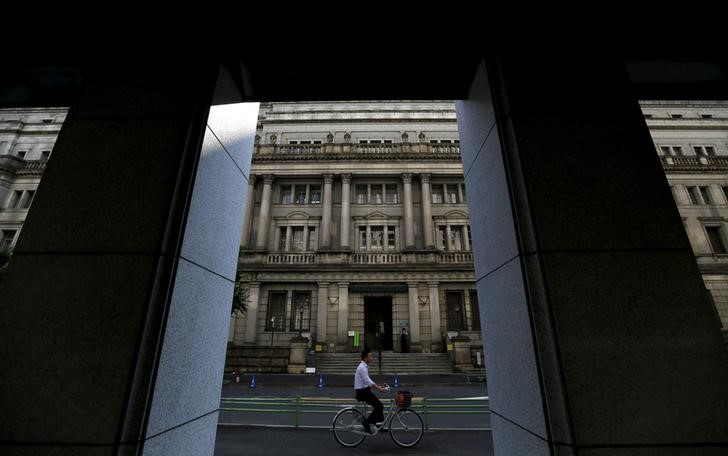By Leika Kihara and Stanley White
TOKYO (Reuters) - The Bank of Japan maintained its massive stimulus programme and upbeat economic assessment on Friday, reflecting its conviction that inflation will accelerate toward 2 percent price growth without additional monetary easing. This optimism was despite growing signs the world's third largest economy contracted in the April-June quarter on soft exports and weak household spending.
As widely expected, the BOJ reiterated its pledge to increase base money, or cash and deposits at the central bank, at an annual pace of 80 trillion yen (413 billion pounds) through purchases of government bonds and risky assets.
"Japan's economy continues to recover moderately," the BOJ said in a statement issued after the decision.
"Exports and output are picking up, albeit with some fluctuations," it said, keeping its assessment unchanged from last month.
Markets are focussing on how BOJ Governor Haruhiko Kuroda will reconcile his optimism on the economic outlook with signs of weakness in overseas demand and household spending.
Many analysts expect gross domestic product data, due out on Aug. 17, to show Japan's economy shrank in the second quarter.
While growth is expected to rebound in the current quarter, some analysts warn that sluggish demand in China and tame wage growth at home will keep any pick-up modest.
At his news conference at 3:30 p.m. (0630 GMT), Kuroda is likely to repeat his view of a tightening job market and rising corporate revenues pushing up wages and capital expenditure, helping Japan hit the 2 percent inflation target by around September next year.
But the BOJ's rosy forecast is increasingly at odds with economists, who say there is very little chance of meeting that inflation target so quickly.
"If the economy does contract in April-June, the BOJ thinks this would be temporary. However, if you start the fiscal year with a contraction, this makes it more difficult to meet the BOJ's GDP forecasts for the entire fiscal year and makes the CPI forecast look more uncertain," said Shuji Tonouchi, senior fixed income strategist at Mitsubishi UFJ Morgan Stanley (NYSE:MS) Securities.
"Consumer prices could dip into negative territory and stay there longer than expected. The BOJ may ease again in October," he said.
Concern about the BOJ's price target could grow after data earlier this week showed real wages fell in June at the fastest pace in seven months.
Renewed falls in oil and commodities prices are also adding downward pressure on inflation.

The BOJ has left policy unchanged since expanding stimulus in October last year, but some economists doubt how much longer the BOJ can afford to remain on the sidelines.